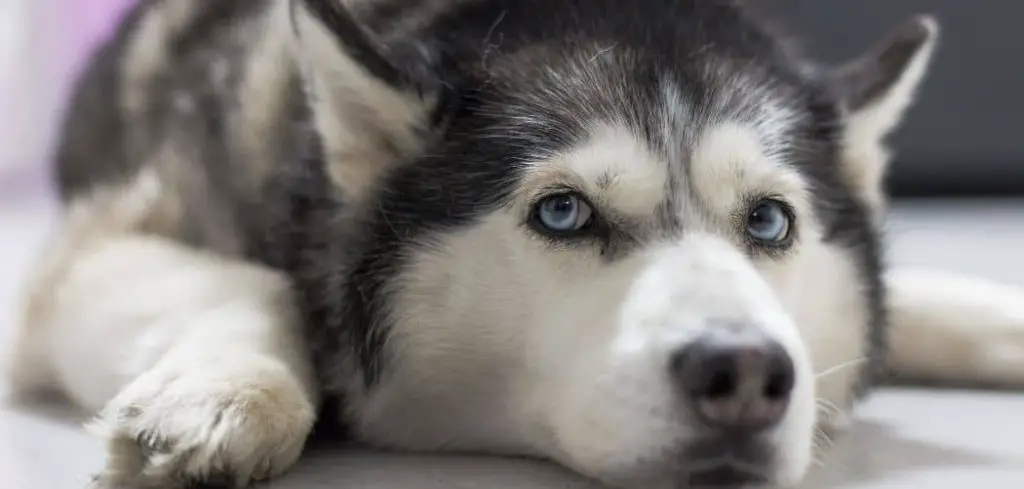It can be concerning for dog owners to notice their pet constantly licking its front paws. While occasional grooming is normal, persistent licking often indicates discomfort, irritation, or an underlying health issue.
This behavior can cause damage to the paw skin, lead to infections, and affect the dog’s overall well-being.
We outline the common reasons why a dog may constantly lick its front paws, what you can do at home, and when to seek veterinary help.
Table of Contents
Dog Constantly Licking Front Paws — Why It Happens
A dog constantly licking its front paws typically signals discomfort, irritation, or an underlying medical condition. Common causes include allergies, skin infections, injuries, parasites, joint pain, or behavioral issues. Persistent licking can also be a response to stress or boredom.
Because the front paws are frequently exposed to environmental irritants, they are a common target for repeated licking and chewing, which can worsen over time if the underlying cause is not addressed.

Dog Constantly Licking Front Paws: Common Causes
Allergies
Dogs are highly susceptible to environmental and food allergies. Pollen, dust, mold, or certain ingredients in food can cause itching and inflammation in the paws.
Nighttime licking is often more noticeable because dogs are less distracted and may feel the itching more acutely.
Owners may notice redness, swelling, or a yeasty odor on the fur around the paws. The constant licking can break down the skin, creating open sores and increasing the risk of secondary infections.
Managing allergies often involves identifying the triggers, using hypoallergenic diets, and sometimes administering veterinary-prescribed antihistamines or topical treatments.
Read more: Dog Licking Front Paws Excessively at Night (Why it happens after dark)
Paw Injuries or Foreign Objects
Small injuries like cuts, scrapes, or embedded objects such as thorns or splinters can make dogs focus on licking the affected area. Licking is their natural response to relieve pain and irritation.
Signs of injury include limping, sensitivity when touching the paw, or visible wounds. Constant licking can delay healing, worsen inflammation, and even lead to infection.
Careful inspection of the paw and prompt removal of foreign objects, followed by cleaning and monitoring, can prevent complications.
Yeast or Bacterial Infections
Moisture trapped between the toes creates an ideal environment for yeast and bacterial infections. Dogs may lick their paws to soothe the itch, burning, or discomfort caused by the infection.
Symptoms include a foul odor, greasy or crusty fur, redness, and inflammation. Over time, infections can spread, leading to more severe discomfort and potential systemic effects if left untreated.
Veterinary treatment may include medicated shampoos, antifungal or antibiotic ointments, and oral medications depending on the severity of the infection.
Parasites
Fleas, ticks, or mites can cause persistent irritation in the paw area. Mange-causing mites burrow into the skin, causing intense itching that prompts repeated licking.
Other signs may include hair loss, scabs, or excessive scratching in addition to paw licking.
Prompt parasite treatment is essential to prevent the spread of infestation and further irritation, which can compromise skin integrity and overall health.
Anxiety or Compulsive Behavior
Some dogs lick their paws excessively due to stress, boredom, or anxiety. This compulsive behavior often occurs when dogs are left alone, experiencing changes in routine, or under environmental stress.
Behavioral licking can lead to raw spots and secondary infections over time. Providing mental stimulation, consistent routines, and, in some cases, veterinary-recommended anti-anxiety interventions can help reduce this habit.
Arthritis or Joint Pain
Older dogs or those with joint problems may lick their front paws as a response to pain in the legs, elbows, or shoulders. Licking can serve as a self-soothing mechanism for deeper discomfort.
Indicators include stiffness, reluctance to move, limping, or decreased activity levels. Treating arthritis early with pain management, supplements, and lifestyle modifications can improve comfort and reduce paw licking behavior.
What to Do If Your Dog Is Constantly Licking Its Front Paws
Begin by examining your dog’s paws carefully for injuries, swelling, redness, or foreign objects. Clean the area gently with lukewarm water and ensure the paws are dry to prevent further irritation.
Applying veterinarian-approved paw balms or soothing sprays can help relieve mild discomfort.
For allergy-related licking, wiping paws after walks, managing environmental allergens, and exploring hypoallergenic diets can be effective.
Dogs suffering from anxiety may benefit from increased exercise, interactive toys, and calming routines. Redirection and gentle deterrence of licking behavior are important to prevent self-injury.
If these home interventions do not improve the licking within a few days, consult your veterinarian for further evaluation.
Persistent licking can exacerbate skin damage and may indicate a more serious underlying condition.
When to Call or Visit Your Vet
Seek veterinary care if your dog exhibits persistent licking that leads to open wounds, bleeding, or raw patches.
Look out for signs of infection such as swelling, foul odor, or discharge. Limping or difficulty walking alongside paw licking warrants prompt attention.
Other signs include lethargy, appetite loss, or fever, which may suggest a more systemic issue.
A veterinarian can identify the underlying cause through tests, and may prescribe antibiotics, antifungals, anti-itch medications, or specialized diets. Early intervention can prevent complications and promote faster healing.
Read more: Dog licking paws excessively (When to worry)
Key Takeaway
Constant licking of front paws is a signal that a dog may be experiencing discomfort, irritation, or underlying medical or behavioral issues.
Addressing the cause early—whether allergies, infections, injuries, parasites, anxiety, or joint pain—helps protect the dog’s paws and overall health.
Home care strategies may provide relief, but persistent or severe cases require veterinary attention to ensure your dog remains healthy, comfortable, and happy.
